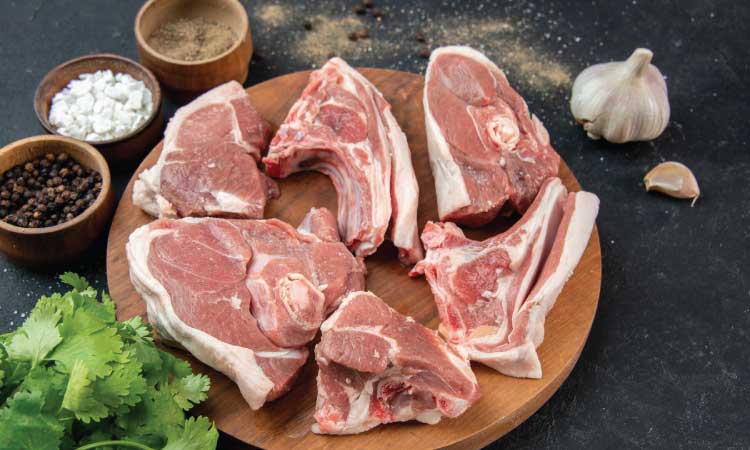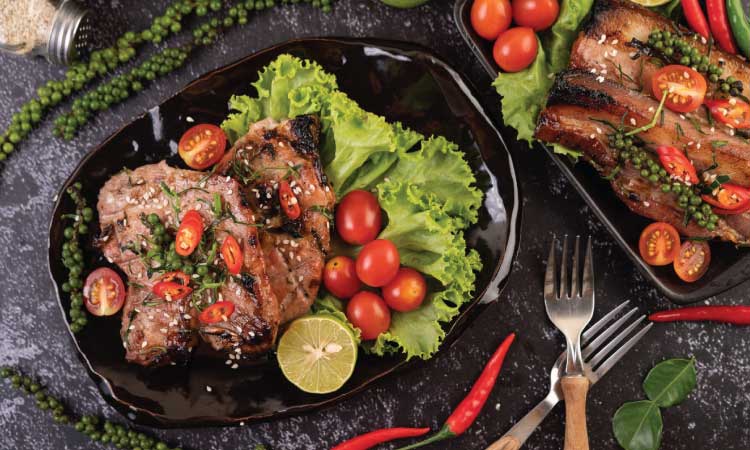Pregnant women have to find a balance between their nutrition and the health of their babies when deciding what to eat. It’s a complex issue with many factors to consider. Knowing the nutritional content and possible health benefits of the food you eat is important when you are pregnant. Craving lamb during pregnancy is not unusual. There is a lot of discussion and differing opinions about whether it is safe to eat lamb during pregnancy.
In this discussion, we will talk about whether it is safe to eat lamb while pregnant. We will look at its nutritional benefits and possible concerns. Are you a biryani lover? Let’s explore its advantages and address any concerns you may have about eating lamb or goat meat during pregnancy.
What Is The Difference Between Mutton, Lamb, And Goat Meat?
Mutton, lamb, and goat are terms that describe the meat from different types of sheep and goats at various ages. The main difference is the age of the animal. Lamb comes from young sheep, mutton comes from mature sheep, and goat meat comes from mature goats. Different types of meat have their own distinct flavors and textures.
Is Lamb Okay To Eat While Pregnant?
Lamb is a safe type of red meat to eat while pregnant, as long as it is cooked thoroughly to a safe internal temperature. The benefits of red meat while pregnant are numerous. Lamb is also good for pregnant women. How you cook lamb is very important, and the cooking time may vary depending on the cut of lamb.
According to USDA,
- The lamb patties must be cooked until an internal temperature of 160 °F is reached in order to ensure their safety.
- Medium lamb (lamb that is cooked to medium doneness (145°F or 63°C), is safe during pregnancy only if the kitchen is able to use a food thermometer to check.
- Ground lamb during pregnancy, such as meatloaf, is safe only if it is cooked to a safe minimum internal temperature of 160 °F
- It is safe to consume lamb chops during pregnancy as long as they are cooked to a minimum internal temperature of 145 °F.
Note**: To ensure the internal temperature, use a food thermometer to measure the temperature before removing the meat from the heat source.
The following table helps you with different cuts of lamb and how to cook them, along with the minimum internal temperature, resting time, and some popular dishes1 :
Lamb Cut Minimum Internal Temperature and Rest Period Popular Dishes Lamb Leg 145 °F (62.8°C), let rest for at least 3 minutes Roasted lamb leg Shoulder 145 °F (62.8°C), let rest for at least 3 minutes Shoulder chops, slow-cooked chops Cubes 145 °F (62.8°C), let rest for at least 3 minutes Kabobs/kebabs, grilled souvlaki, skewers Ground lamb 160 °F (71°C), no resting time Lamb burger, ground steak with gravy, meatballs, nachos, tamales, kibbeh Loin, chops, rib 145 °F (62.8°C), let rest for at least 3 minutes Grilled sirloin, lamb sirloin crostini, lamb chops, honey glazed lamb ribs, BBQ lamb ribs Bigger cubes 145 °F (62.8°C), let rest for at least 3 minutes Irish lamb stew, Moroccan lamb stew Shank 145 °F (62.8°C), let rest for at least 3 minutes Crockpot lamb shank, stewed lamb shank, braised shanks Breast, Rolled 145 °F (62.8°C), let rest for at least 3 minutes Roasted lamb breast, slow-roasted lamb breast, stuffed lamb breast, and grilled lamb breast
The safety of consuming organ meats, such as lamb kidneys, brain, heart, tongue, tripe, and others, during pregnancy has not been well researched. All the same, the answer to the question “Is lamb’s liver good for you during pregnancy?” is no.
Calculate Due Date With LMP
Related Reading: Chicken During Pregnancy: Benefits, Risks And Precautions
The NHS advises pregnant women to avoid consuming lamb liver or any food products that contain liver. The presence of high levels of vitamin A in the liver can potentially endanger the developing fetus, which is why it is advised to avoid consuming the liver while pregnant.
Precautions to Consider When Eating Lamb While Pregnant

Lamb is a good source of protein, iron, and zinc, all of which are important for a pregnancy diet. However, there are some precautions to consider when eating lamb or any meat during pregnancy:
- Eating undercooked lamb or raw lamb during pregnancy should be avoided, as they increase the risk of food-borne illnesses such as salmonella or toxoplasmosis2. Toxoplasmosis has the potential to result in miscarriage and can also lead to various complications during pregnancy3.
- Practice proper food handling to avoid cross-contamination. To prevent the spread of bacteria, it is important to keep raw lamb separate from other foods, utensils, and surfaces. It is important to wash your hands thoroughly after handling raw meat.
- Refrigerate or freeze uncooked lamb in an appropriate manner to inhibit bacterial growth.
- Select lean lamb cuts in order to decrease the consumption of saturated fats. During pregnancy, an excess of saturated fat may contribute to health problems.
- It is not recommended to brown or partially cook lamb and then refrigerate it to finish cooking later. This is because any bacteria that may be present in the meat would not have been fully destroyed.
- It is a good and safe practice to pre-cook or partially microwave before being transferred to a hot grill or conventional oven to complete the cooking process4.
- Ensure that the burgers, sausages, and whole cuts of lamb are cooked through to the point of complete steaming. Also, ensure that there is no pink meat and that the juices do not contain any pink or red color5.
- When consuming lamb from a restaurant while pregnant, it is important to be cautious and ensure that there are no signs of pink or blood in the meat.
Benefits Of Eating Lamb During Pregnancy
Pregnancy is characterized by increased nutritional needs to support both the mother and the growing fetus. Lamb is a rich source of essential nutrients that contribute to the overall well-being of both mother and child. Now, can we explore some benefits of lamb during pregnancy?
Lamb is an excellent source of protein, selenium, zinc, vitamin B2, vitamin B6, and vitamin B12. It also contains a considerable amount of vitamins like thiamine and minerals like iron, copper, phosphorous, potassium, magnesium, and sodium6.
Here are eight important reasons why it’s beneficial to include lamb in your diet while you’re pregnant.
1. Lamb is a source of high-quality protein
Lamb is an excellent source of high-quality protein7. Protein is crucial for the development of the fetus’s organs, muscles, and tissues. According to studies, one in every eight women in their second and third trimesters of pregnancy consumes insufficient protein.
During the third trimester, your baby experiences rapid growth, which means there is an increased need for protein. Therefore, consuming lamb during the pregnancy’s third trimester can be beneficial.
2. Helps to improve immunity
Zinc, which is present in lamb, plays a crucial role in supporting immune function8. During pregnancy, a woman’s immune system is compromised, and maintaining optimal zinc levels is essential for both the mother and baby to resist infections and ensure a healthy pregnancy.
Also, selenium, found in lamb, acts as an antioxidant, protecting cells from damage and supporting overall health.
Related Reading: 11 Simple Ways To Boost Immunity During Pregnancy
3. Power Of B vitamins
Lamb is a nutritious meat that provides a wealth of B vitamins, such as B6, niacin, riboflavin, and folate. These vitamins are crucial for energy metabolism, red blood cell formation, and the prevention of neural tube defects9.
- Niacin has the potential to enhance digestion, alleviate nausea, and provide relief from severe migraines
- Thiamine is vital to fetal brain development
- Riboflavin not only provides a youthful, healthy glow to the skin but is also vital for eye health
- Folate, or folic acid, is a crucial B vitamin to take during pregnancy for a very important reason. Taking the right amount of folic acid can lower the chances of your baby having neural tube birth defects, such as spina bifida
4. Helps with bone health
Lamb is a good source of phosphorus, which is important for the development of the baby’s bones and teeth. Further, collagen in lamb supports the formation of connective tissues in both the mother and the developing fetus.
5. Helps reduce the risk of iron deficiency anemia
Pregnancy increases the risk of anemia as the blood volume increases by 50% to support the growing fetus. The body can absorb heme iron, which is present in lamb, more easily than non-heme iron, thereby boosting iron levels. This helps to reduce the risk of anemia.
Risks Associated With Eating Lamb During Pregnancy
Although lamb can contribute to a healthy and balanced diet, there are certain factors to consider and potential risks to be aware of when consuming it while pregnant.
Pregnant women need to be aware of the following risks associated with eating lamb during pregnancy:
- Lamb, like other meats, maybe a source of Toxoplasma gondii, a parasite that can cause toxoplasmosis. Pregnant women are particularly susceptible, and infection may lead to serious complications for the fetus.
- Lamb can be higher in cholesterol and saturated fat compared to other lean meats. Excessive intake of saturated fats may contribute to gestational diabetes and increase the risk of heart-related issues10
- Cross-contamination during lamb processing and handling can lead to foodborne illnesses.
- Nitrates may be found in processed lamb products like cured or smoked meats. While nitrate consumption in moderation is generally considered safe, excessive intake may pose risks, including potential complications during pregnancy11
- Lamb contains a high amount of sodium. Therefore, consuming too much during pregnancy can raise your blood pressure and cause negative outcomes
- Any type of mammal meat, including goat, sheep, cow, and seal, can result in an allergic reaction12. Allergic reactions can range from mild to severe, and pregnant women with known allergies should avoid lamb or any other allergenic foods
Related Reading: 7 Signs Of Low Potassium (Hypokalemia) During Pregnancy And 5 Ways To Deal With It
Which Meat Is Best For Pregnancy?
Lean meats are ideal for pregnancy. They offer essential nutrients such as protein and iron while being lower in fat.
To sum up, adding lamb to your diet while you are expecting can be a wise decision. Lamb, being high in vital nutrients like iron, zinc, and protein, is a great way to support the health and development of the fetus. When it comes to consuming lamb during pregnancy, it is important to emphasize moderation and the use of appropriate cooking techniques.


